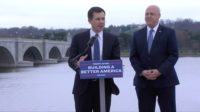A series of fierce contests for federal transportation dollars is starting to reshape how funds for rail, transit and other projects are distributed. So far this year, the U.S. Dept. of Transportation has awarded nearly $10.6 billion successful bidders and is expected to announce soon winners of $2.9 billion more in funding. Cash-strapped state and local agencies are seeking far more aid than DOT has available.
Congress set criteria for some of the grants, but DOT decides who wins—to some observers, that’s the rub. Industry officials wonder whether DOT will seek to expand the use of such “discretionary” grants. Key congressional Republicans contend DOT has not been transparent enough about how it picks the winners.
Discretionary DOT grants are not new, but they got a push from the 2009 stimulus act, which provided $9.5 billion for high-speed rail and Transportation Investment Generating Economic Recovery (TIGER) grants.
As DOT prepares to propose a new surface-transportation bill next year, it wants to increase discretionary funding in the highway program. Roy Kienitz, DOT undersecretary for policy, says about 85% of federal highway funds now are distributed to states according to formulas, using such factors as lane miles and vehicle miles traveled. Kienitz says DOT won’t propose eliminating formula aid, noting, “The formula is always going to need to be the biggest part of what we do [in highways] because we have such a huge built infrastructure.”
Further, Kienitz says DOT wants to boost the discretionary highway share, which is about 3% now. He says, “It doesn’t necessarily need to be more than 10% to 20% of the dollars. It needs to be enough so that the grantee community pays attention.”
Some Republicans are raising questions about DOT’s grants. Earlier this year, Sen. Christopher Bond (R-Mo.) and Rep. John Mica (R-Fla.) asked the Government Accountability Office to launch a study of DOT’s selection process and other aspects of the high-speed rail and TIGER grant programs.
American Highway Users Alliance President Greg Cohen foresees “a continual effort by the administration to carve out more money for their discretion.” If the GOP gains control of one or both houses of Congress, he says, “There’s going to be a lot more effort by Congress to not give [DOT] that authority.”
| PROGRAM | REQUESTED | AVAILABLE (DATE AWARDED) |
|---|---|---|
| High-speed rail I | $57 billion | $8 billion (Jan. 28) |
| High-speed rail II | $8.5 billion | $2.35 billion* |
| TIGER I | $60 billion | $1.5 billion (Feb. 17) |
| TIGER II | $19 billion | $600 million* |
| Bus “state of good repair” | $4.2 billion | $776 million (Oct. 4) |
| Bus and bus livability | $2 billion | $163 million (July 8) |
| Urban circulator | $1 billion | $130 million (July 8) |
| *No awards announced as of Oct. 5 Source: U.S. Dept. of Transporation, ENR | ||



